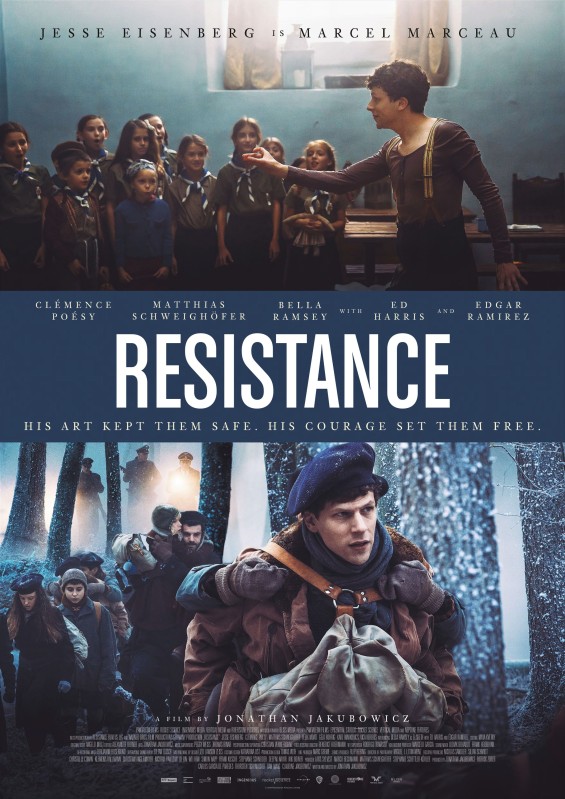“We Have to Save the Children.” – Emma
During the German occupation of France in 1940, a young Jewish man named, Marcel Mangel, fled with his family to Limoges where his cousin, Georges Loinger, a member of the French Resistance, urged him to join the cause. Eventually, both Marcel and his older brother, Alain, would join the French Resistance, adopting the last name, Marceau, and helping rescue countless Jewish children from race laws and concentration camps. Throughout his time in the Resistance, Marcel frequently used his skills as a mime artist to keep the children quiet and entertained as he helped them escape to Switzerland. With all that in mind, it’s difficult to imagine how a filmmaker could possibly disappoint when creating a cinematic interpretation of Marcel’s extraordinary story, but 2020’s Resistance is just that; a disappointment. Serving as a flawed yet honourable biopic that somewhat pushes past its varying performances and peculiar execution to function as an earnest tribute to its real-life protagonist.
Plot Summary: Before he became a world-famous mime, aspiring Jewish actor and artist, Marcel Marceau, joined the French Resistance alongside his brother, Alain, in an effort to save thousands of orphaned Jewish children from the impending threat of the Third Reich…
Written and directed by Jonathan Jakubowicz (Secuestro Express, Hands of Stone). The screenplay for Resistance continuously appears distracted, creating a scattershot portrait of Marcel Marceau’s life when it could’ve easily been a straightforward celebratory biopic documenting his valiant actions and incredible feats throughout the Second World War. The perfect example of the film’s unconventional approach can be seen in the structure as Resistance bizarrely chooses to tell Marceau’s story through the means of a flashback, narrated by General Patten (portrayed by Ed Harris) as he addresses the serried ranks of the U.S. troops who have just liberated France. This flashback structure adds nothing of value to the plot and ultimately only serves as a distraction. However, the film does partially redeem this issue during its epilogue as the filmmakers pay respect to the real-life events they’re documenting, inserting text that states that the Nazis killed over a million children during World War II and that this film is dedicated to them.
When it comes to the cast, the supporting actors of Clémence Poésy, Félix Moati, Vica Kerekes, Bella Ramsey and Matthias Schweighöfer all give serviceable performances as various members of the French Resistance and those who oppose them. The standout, however, is, of course, Jesse Eisenberg, who portrays Marcel Marceau himself. And even though Marcel’s personality is only explored in bullet-point tropes, swiftly moving from one trait to the next, Eisenberg portrays the war hero with complete serenity, his performance only being hindered by his inconsistent French accent. Still, there are plenty of undeniably tense moments that showcase Eisenberg’s ability to jump from comedic to dramatic acting on the fly.
Visually, Resistance is more than competent as the cinematography by Miguel Ioann Littin-Menz has its fair share of attractive shots, often utilising the story’s diverse mix of locations to great effect with symmetrical lines. And for all its unusual choices in terms of structure, it can never be stated that Resistance leans too hard on certain moments to drain them of maximum emotion. Take the opening scene, for example, in which a little girl’s house is raided by Nazis who subsequently kill her parents. A brief scene, during which, we see no on-screen violence whatsoever. With that said, the colour palette of Resistance never tries to be anything but gloomy and grey. Whilst I understand that this was likely done to further establish the story’s World War II setting, even in more cheerful moments where Marcel makes the children laugh, Resistance rarely employs vibrant colours in its visuals.
Similarly, the film’s music is a rather mixed bag, as while the original score by Angelo Milli features a handful of memorable tracks, such as You Are Not Alone and Adagio for a Silent Performance, both of which help add dramatic weight to the scenes they are featured within. There are also plenty of moments where the film is lazily manipulative with its audio as the sound of an angelic children’s choir is contrasted with scenes of brutal executions.
Another problem Resistance suffers from is its overabundance of subplots, an issue that frequently results in a complete lack of narrative focus. From Marcel’s somewhat strained relationship with his father, who after seeing one of his performances as Charlie Chaplin calls him; “A Clown Dressed Like Hitler in a Whore House,” to a similar kind of resentment toward his brother, as well as a romantic fling with fellow Resistance member, Emma. Nearly every subplot in Resistance goes nowhere and practically fades into thin air by the time the end credits roll. Proving that when it comes to biopics, more story doesn’t necessarily mean a better story.
In summary, Resistance is neither a fully drawn biopic nor a thrilling war epic despite its largely convincing performance from Jesse Eisenberg as the mime artist-turned-war hero. The main reason for this is that Resistance constantly feels as if it isn’t sufficiently delving into Marcel’s numerous talents or his brave endeavours within the French Resistance. Nevertheless, I do believe this was a film worth making as its mere existence helps in celebrating Marcel Marceau’s remarkable life. A life that many may not have even been aware of before this film’s release. Rating: low 6/10.

This sounds really interesting…. and I’m curious to see whether I’ll agree with your rather low rating.
LikeLiked by 1 person